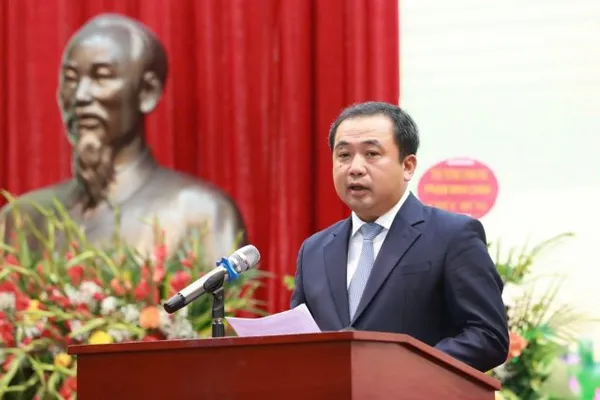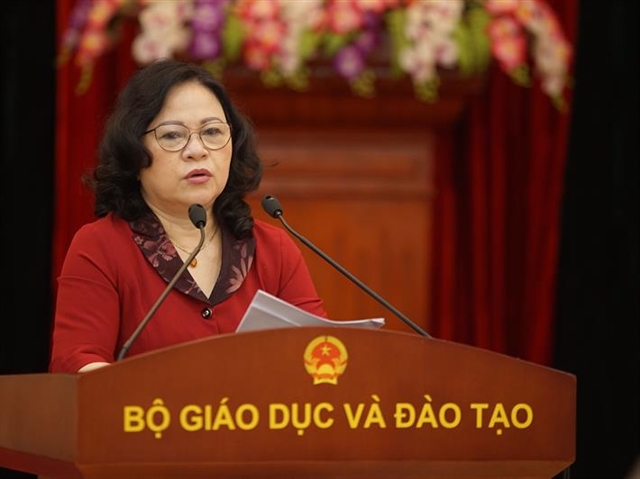 Opinion
Opinion

Deputy Minister of Education and Training Ngô Thị Minh spoke to Vietnam News Agency on issues related to school psychological counselling in response to rising public concern over the mental health of school-aged children.

|
| Deputy Minister of Education and Training Ngô Thị Minh. — VNA/VNS Photo |
Deputy Minister of Education and Training Ngô Thị Minh spoke to Vietnam News Agency on issues related to school psychological counselling in response to rising public concern over the mental health of school-aged children.
The stress and pressure from the pandemic, from studying, family, and peers that adolescents faced in schools have led to heart-breaking incidents, including suicides of young students, that have been spurring public concern, and the reported ones are still obviously just the tip of the iceberg. So how is school psychological counselling being implemented, and what has the ministry done in coordination with the local education departments and schools to address this issue?
The ministry has directed the local education departments and education institutions to strictly implement the legal provisions as well as directives from Prime Minister and Education Minister on psychological counselling in schools, strengthening the implementation of psychological counselling support to improve the quality and effectiveness of these activities at education institutions.
The ministry has also issued the Plan to implement psychological counselling in schools in 2022 and in the 2022-25 period.
In the future, the ministry will continue to focus on directing the following activities –coordinating with the Ministry of Labour, Invalids and Social Affairs, the Hồ Chí Minh Communist Youth Union, and international organisations in Việt Nam to carry out psychological counselling support activities, especially with a focus on helping disadvantaged students. It will continue researching, reviewing, and proposing amendments to Circular 31/2017/TT-BGDĐT on guiding the implementation of psychological counselling for students in high schools and Circular 33/2018/TT-BGDĐT dated December 26, 2018 on guidelines for social work in schools, in which clearer stipulation on the process of performing psychological counselling and responsibilities of related parties. Additionally, it will review and propose arrangements for personnel with psychological experience in line with each school’s particular conditions.
The ministry also directs the development of a network of establishments providing psychological counselling services in schools; diversifying and improving the quality of psychological counselling service provision in schools, in accordance with needs and social contexts; and developing criteria for psychological counselling activities in educational institutions.
We are also working on guidelines and handbooks for teachers working as psychological counsellors in schools, especially in handling children who suffer from abuse and harassment.
Training/capacity-building courses will be a priority to enhance the professionalism of counselling staff in schools.
The reality is that in most schools, the staff double as counsellors, and only a very small fraction boast a separate counselling room with dedicated personnel. How does the education ministry plan to address this situation?
There are a number of measures that the ministry is continuing to implement in order to resolve the issues.
We will continue to raise awareness for administrators and teachers on the importance of psychological counselling in schools. More experiential activities, group activities, sports and hobbies clubs, etc. are recommended as a way to raise awareness about the obligations of children and students to their families, grandparents, and parents, to themselves and to the community; and hopefully, these activities could help them get a sense of meaning in life.
We are working closely with the Ministry of Home Affairs and the Ministry of Finance to review and issue guidelines on policies and employment positions for focal staff in charge of psychological counselling, to have appropriate policies and guidelines on financial support for school psychology counselling.
Other than organising training, fostering and improving the quality of management staff, teachers and staff working in psychological counselling, there is also a need to supplement personnel with substantive expertise in order to maintain and improve the effectiveness of school counselling efforts.
There will also be assistance from international organisations in the development of social works in the field of education and training, especially in areas like child protection, school counselling, school violence, etc.
We could also look at mobilising the private sectors’ resources in the provision of psychosocial counselling for students.
What is the best course of action that families, schools, and teachers can do to minimise so-called ‘school depression’ in adolescents?
From practical experience, I think that, on the part of teachers, they need to control their own emotions, they need to know and practise active listening skills and create ample space for talks and conversations with students so that the two sides can gain a better understanding and become sympathetic to each other.
Students with psychological issues will need attention, care, and encouragement.
Schools should really spend time and resources on networking/team building activities, and games that stimulate communication skills.
Teachers should be equipped with knowledge to identify the signs of adolescent depression and other psychological issues that their students might be suffering from, to cooperate with the families to have interventions and assistance in a timely manner.
For schools not able to have a dedicated psychological counselling room or dedicated counsellors, homeroom teachers and subject teachers need to pay attention to students, especially the signs of mental trouble in children, and discuss and work with their parents/guardians.
Schools also need to spend necessary resources on surveying and screening to detect issues related to physical and psychological health in students, coordinate with concerned organisations and individuals to organise programmes and activities to provide students with knowledge and skills to deal with psychological problems.
Parents should not put overwhelming pressure on their children with regard to academic performance, tests, and even social relationships. Parents need to understand that each child has their own strengths and parents can help to nurture these strengths, but really should refrain from forcing their children to study too much at the expense of everything else, and do not compare children to other peers – all of which could seriously affect their mental health, their growth/development, and stress the endurance of the children.
I say that parents should spend more time talking to children, listening to them more, helping them achieve sufficient amount of sleep and nutrition needed for development at this critical stage, and the right balance between mental-oriented exercises and leisure, entertainment, and sports activities.
Parents need to pay attention to their children’s behaviors and attitudes to spot signs of stress, anxiety, fatigue, etc. to have proper interventions. They could teach their children positive self-reinforcement messages to help overcome some psychological difficulties.
For children with signs of depression and anxiety disorders, parents need to take them to the nearest medical facility for support.
And last but definitely not least, parents need to work closely with teachers and schools to ensure and improve their children’s learning ability, and to choose the right curriculum that suits their children’s needs and abilities. — VNS




